Establish a deep knowledge of executive function (EF) throughout your organization and meet your project objectives with the complete professional learning course library from Reflection Sciences. This subscription includes unlimited access to the complete online library of eight self-paced courses, plus access to educational webinars and our educators' newsletter.
Optional enhanced implementation support is available at an additional charge upon request.
Users may get 2-3 clock hours per course, depending on the course. Please see module descriptions for details on clock hours. Optional live guided online instruction sessions can be added for $1,500 per session (up to 25 users per session).
Purchase the complete curriculum or individual course modules.

Executive Function (EF) refers to the skills needed for the deliberate, goal-directed self-management of attention, thought, action, emotion, and motivation. These skills, which include cognitive flexibility, working memory, and inhibitory control, develop rapidly during early childhood, support school readiness and socioemotional competence, and more generally, serve as a foundation for effective learning and adaptation across a wide range of situations.
This course will cover what is known about EF and why there is currently so much interest in EF among educators and parents; how executive function is tied to the brain, and how both develop as a function of experience; how to measure EF in childhood and across the lifespan; and, effective ways to support its healthy development in the early childhood classroom
Key Ideas:
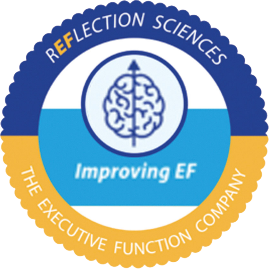
Executive Function (EF) skills are essential for most tasks that your student (and you!) will do throughout the day. It develops over time and with appropriate strategies, it can be taught and learned throughout lifetime. By using intervention strategies in your classroom, it will support ALL learners both academically and social emotionally.
This course on building and improving Executive Function skills will draw upon existing scientific literature, illustrative videos, and interactive discussions to help participants gain a deeper understanding of EF skills and how to support them in children. The material will highlight general principles for using EF activities in the classroom and specific ideas for merging EF support with existing curricular and programmatic goals.
Key Ideas:
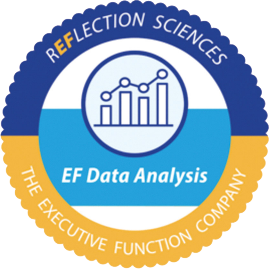
Now that you have a better understanding of executive function (EF) and have started measuring your students' EF skills with our assessment tool, what can you do with this information? You can use this data, in combination with your own observations and teaching expertise, to create an environment that accommodates students of all EF levels.
This course will review how to use the data from EFgo™ to create a learning environment that best supports each student's EF skills. You will learn what data is available and how to interpret what it means. We will also show you ways to merge this data with other observational data in your classroom, present research-based best practices for working with students of all EF skill levels, and demonstrate how to create buy-in with parents and other caregivers.
Key Ideas:
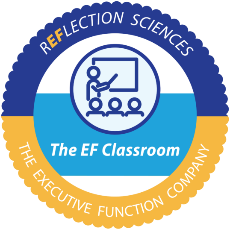
With only so many hours in the day, it can feel overwhelming to think about adding a new curriculum or activities into your classroom. You already have a good understanding of what executive function (EF) skills are and why they are important for school success, buy how can you incorporate EF into the classroom while still having time for everything else you need to get done?
In this 2-hour course, you will build on your existing knowledge of EF to inform practices within your classroom. The goal of this course is to help you develop an "EF mindset," meaning that you will begin to think about how EF skills relate to many different aspects of your teaching and classroom environment. Rather than adopting an entirely new EF curriculum, we will review ways to integrate EF practice into what you are already doing. You will explore how EF skills relate to learning and also problem behavior, ways to structure your classroom to support EF development, and strategies for infusing EF into other content areas, such as math, literacy, and social and emotional learning.
Key Ideas:
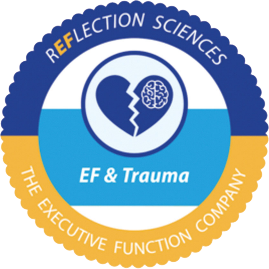
In the height of COVID-19, many students are experiencing trauma and are having difficulties coping. About half of all children have at least one adverse life experience. This means that a number of students in your own classroom are grappling with the trauma that can be associated with these adversities. Trauma, especially early in life, can have lasting effects on multiple domains of development, including Executive Function (EF) skills. As educators, it is important to understand how trauma 'shows up" in the classroom to support all students.
This course is a brief introduction to the role of trauma on EF. By the end of the course, you will be able to define trauma, identify potential causes, understand how trauma relates to EF development across childhood, and learn how this pandemic may change how you approach children's concerns and worries.
Key Ideas:
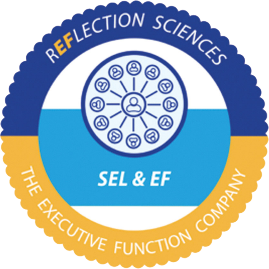
Consider for a moment the student behaviors that you think are important for school success. Did you think of things like following directions, getting along with others, and regulating emotions? These examples are social-emotional skills and they play an essential role in student learning. The good news is that social-emotional learning (SEL) is supported by executive function (EF) skills! This means you just need to add a few tools to your EF toolkit to incorporate SEL into your classroom rather than starting from square one.
In this 3-hour course, you will learn the basics of social-emotional skills and ways to promote SEL in your classroom. Throughout the modules, you will explore what supports the development of social-emotional skills and the relationship between SEL and EF. We will show you how to focus on both SEL and EF skill development through mindfulness and reflection practices and introduce you to successful SEL programs. The goal of this course is for you to gain a getter understanding of SEL and to feel comfortable including SEL practices into your curriculum and instruction.
Key Ideas:
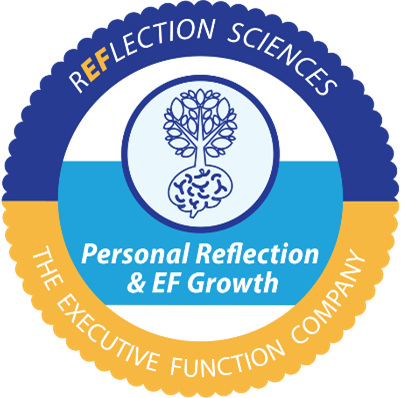
Today, more than ever before, educators are under immense pressure in the classroom and must rely on Executive Function skills for assistance. Dealing with the challenging behavior of students requires inhibitory control, providing effective instruction both in-person and online requires cognitive flexibility, and remembering to follow up on family and student inquiries after hours can stress working memory. What helps you maintain balance and support your mental health? Executive Function skills.
This 3-hour course focuses on Executive Function and what it means to you personally and professionally. It is important to understand how you and your students rely daily on Executive Function skills and how to strengthen your own Executive Function for your well-being inside and outside of the classroom.
Key Ideas:
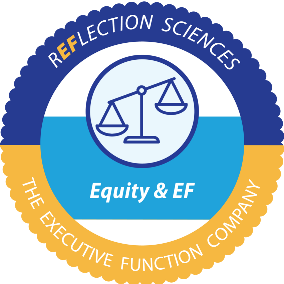
This course investigates how bias, equity, and Executive Function play a role in educating today's students. You can choose to complete it in one or many sessions individually or as a group. Included in each module is a Reflect and Apply section to facilitate discussions.
Key Ideas:
* This item will be drop shipped directly from the vendor. Please allow 2-6 weeks for delivery.